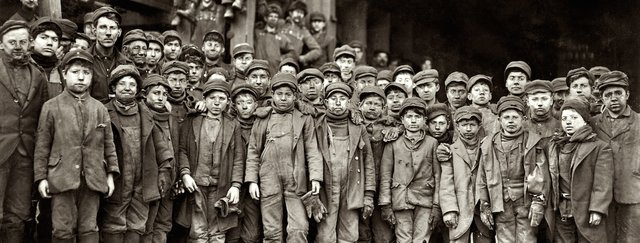
Only a few hundred years ago, to work for a wage was considered demeaning, because you were a dependent, unable to provide directly for your own needs. In other words, your family-community was not allowed enough land to be self-sufficient in terms of food, fuel, etc; and make no mistake, this was the only way to get people to be 'industrious' - the threat of starvation.
The agricultural and industrial 'revolutions' were nothing to do with 'new' technology, nor were they intended to increase productive output - they were instead crude acts of political warfare, designed to undermine self-sufficient rural communities, turning free and independent folk into 'workers' (i.e. wage slaves) a title many still proudly hang around their own necks.
"In the past, if anyone called a tradesman a worker, he risked a brawl. Today, when they are told that workers are what is best in the state, they all insist on being workers." M. Mav. 1948.
"It was the sad fate of the English poor to be the first to be subjected to the unmitigated brutality of this developing social mechanism. It goes without saying that they considered this fate an absolute degradation, and those who accepted it were scorned by their peers. At the time of the Levellers, it was already commonly considered that those who sold their labor for a salary had abandoned all the rights of "free-born Englishmen." Leopold Roc, Industrial Domestication.
"Poverty is therefore a most necessary and indispensable ingredient in society. It is the source of wealth, since without poverty, there could be no labour; there could be no riches... no benefit to those who may be possessed of wealth." Patrick Colquhoun, enclosure supporter and founder of the first police force.
"…everyone but an idiot knows that the lower classes must be kept poor, or they will never be industrious." Arthur Young, top economist of his day, 1771.
"The military arts were applied to industry, and factories were literally modelled after prisons, which in effect made their appearance at the same time." Ashton, 1725.
"Hunger is not only a peaceable, silent, unremitted pressure, but as the most natural motive to industry, it calls forth the most powerful exertions. . . . Hunger will tame the fiercest animals, it will teach decency and civility, obedience and subjugation to the most brutish, the most obstinate, and the most perverse.” Reverend Joseph Townsend.
Curated for #informationwar (by @commonlaw)
Our purpose is to encourage posts discussing Information War, Propaganda, Disinformation and other false narratives. We currently have over 7,500 Steem Power and 20+ people following the curation trail to support our mission.
Join our discord and chat with 150+ fellow Informationwar Activists.
Connect with fellow Informationwar writers in our Roll Call! InformationWar - Contributing Writers/Supporters: Roll Call Pt 10
Ways you can help the @informationwar
Downvoting a post can decrease pending rewards and make it less visible. Common reasons:
Submit